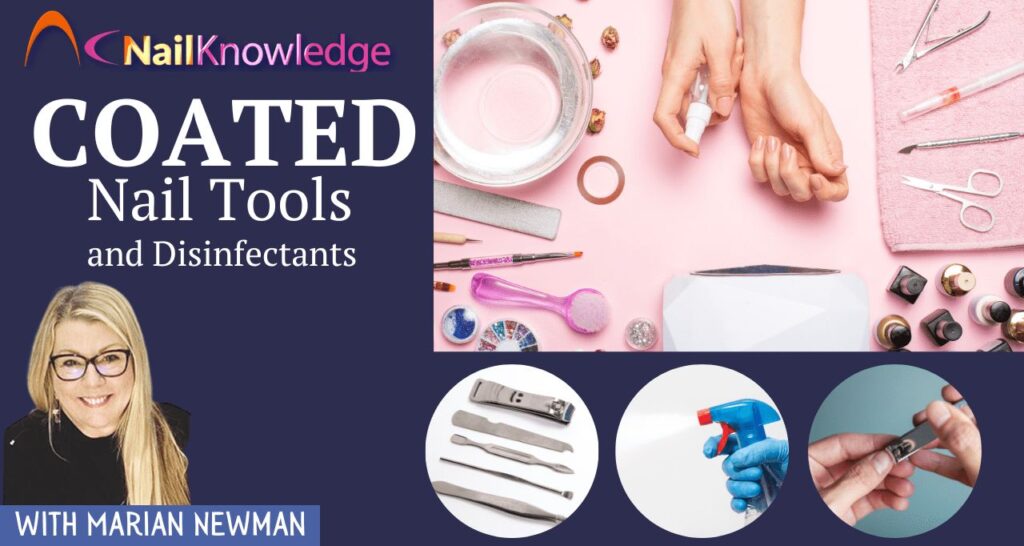The nail sector uses a lot of metal tools and there is a trend for coated nail tools for which there are many varieties available.
Why are coatings used on metal nail tools, and what purpose do they serve?
Coatings are applied to metal nail tools for specific purposes related to protection and appearance. While good quality stainless steel is durable, coatings can offer an additional layer of safeguarding against scratches, wear, and rusting, which can occur over time.
The primary purpose of these coatings is to enhance the longevity the tools. Additionally, certain coatings, such as titanium, have been claimed to exhibit bactericidal properties, potentially providing an extra layer of hygiene during their use. However, it is essential to consider the composition of the coating and its compatibility with disinfectants to ensure effective and safe sterilisation.
Ultimately, the use of coatings on metal nail tools aims to strike a balance between protection and durability while upholding proper hygiene standards in the nail industry.
Stainless Steel Grades and Coatings for Nail Tools
Good quality stainless steel does not need protection. There are many grades of stainless steel with 316 being the superiorgrade and 304 being the common and less expensive version.
Even the best grade of steel is not immune to damage from scratching, bluntness and rusting. Obviously, the coating can help protect from scratches but coatings can wear off exposing the steel underneath.
Disinfection and Coated Nail Tool Compatibility
Most proprietary disinfectants use water to dilute them and prolonged immersion in water will cause rusting. Following manufacturers instructions for dilution and immersion MUST be followed. If they say immerse for 10 minutes then tools must be removed, rinsed with water and allowed to dry or rusting will occur.
There are some disinfectants that are not suitable for coated tools and this should be clear on the label as a contraindication. Read the labels or ask the manufacturer.
Importance of EN Numbers in Disinfectant Selection
Disinfectants come in various grades, each identified by an EN number printed on the label.
The EN number represents the disinfectant’s effectiveness against specific types of pathogens. For instance, EN13624 indicates that the disinfectant has been tested for fungicidal and yeasticidal properties, making it suitable for pedicure tools as fungal infections are more common on feet.
On the other hand, EN13727 signifies that the disinfectant is bactericidal, effective against bacteria.
Similarly, EN14476 indicates its efficacy against viruses. Therefore, the selection of the appropriate disinfectant should consider the intended use of the tools and the specific pathogens they may come into contact with.
It’s important to note that there is no one-size-fits-all disinfectant for all situations.
Considerations for Disinfectant Selection and Nail Tool Preparation
Choose your disinfectant wisely and with reason and fitting to your Risk Assessment for your services.
Isopropyl alcohol (widely used in hand cleansers) can be used but it does depend on the purity of the alcohol and what it’smixed with. It evaporates very quickly and it efficiently needs contact in minutes rather than seconds.
But ALL disinfectants are useless unless the tools are cleaned first as any debris such as oils, skin, and nails are present. Cleaning with soap and water and scrubbing with a brush is essential as the first stage of disinfecting.
Back to coatings: there are some tools coated in titanium which claim to be bactericidal. It is a coating commonly used in bone implants. What is in the coating is very relevant and how it responds to the various disinfectants is also relevant.
In conclusion, for keeping your tools as. hygienic as can be is not just a matter of buying a disinfectant and putting your tools in it and leaving them. There is much more science to it than that and every nail pro should do their own due diligence with regard to the quality of tools being used and if the disinfectant is appropriate for the service the tools are being used for
The most important advice is to follow manufacturers instructions to the letter, cleaning tools first and asking questions of your tool supplier and disinfectant manufacturer. Good suppliers/manufacturers should have no problem answering any questions you may have.
With all of the above in mind, we at NailKnowledge recommend Mundo
(with thanks for providing so much information on testing) and Labology 3 (for your dedication).


